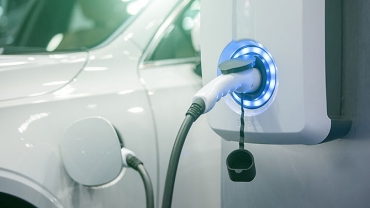
Why oil and gas companies are transforming business models to sell services into your home
Our collaboration with the FT and World Economic Forum explores how technological shifts are transforming industry, business and society.
Imagine a world in which there is a fridge-sized energy storage battery in the basement of your home, solar panels on your roof and an electric vehicle smart charger installed on your driveway – all connected to a device controlling the appliances in your home.
Now imagine the type of company most likely to be providing this as a seamless service. That company may not be the utility company that currently provides you with your electricity and gas. It may actually be a large oil and gas company with operations all the way from drilling on an offshore oil rig to selling petrol at the pump.
This is not as far-fetched as it may sound. As demand for some of their core hydrocarbon-based products are tapering off, oil and gas companies are grappling with how to adapt their businesses to a lower carbon world.
As a result oil and gas companies are diversifying into renewable sources of power, electric vehicle charging solutions - and even electricity retail, bringing them into direct competition with the utility companies that have long been providing energy services into people’s homes.
This will transform the market into one in which traditional utility companies and legacy oil and gas companies are competing to provide these services.

“This will be less about just selling kilowatt hours of power – a commodity - and more about the provision of services, particularly for household energy,” says Adrian Del Maestro, Director of Research in the Energy, Utilities and Resources practice at Strategy&, PwC’s strategy consulting house.
Last year saw two big signs of this new world taking shape: French oil major Total announced plans to buy Direct Energie in a €1.4bn deal, continuing its expansion into the residential power market, while Royal Dutch Shell has acquired UK power supplier First Utility – recently rebranded Shell Energy - giving it access to retail electricity consumers for the first time.
The power and utilities sector has not been immune from these forces either. In the UK, the growth of renewables, energy storage and digital solutions for energy efficiency have combined to move the electricity generation and distribution model from one that is centralised, to one that involves distributed generation systems producing power closer to the consumer.
New developments such as micro grids - small technological ecosystems that can supplement or replace a central power grid – and local generation and storage, all create opportunities to engage with customers, right into their homes.
In addition to weakening demand for some core hydrocarbon products, two other factors are driving this change: activist investor and consumer pressure for environmentally-responsible energy sourcing; and new technologies.
The energy sector is disrupting itself because it needs to,” says Roberto Bocca, Head of Future Energy and Materials, World Economic Forum, “The incumbents, the big energy players, also have an interesting evolution ahead because more demand is coming: there are more consumers around the world.”
Technology, especially around the Internet of Things (IoT), is allowing the evolution of new business models. In the UK, PwC estimates that the IoT has created a £11bn market in “connected home” technology, and involving domestic appliances that are connected to the internet to optimise energy consumption.
The energy sector is disrupting itself because it needs to. The incumbents, the big energy players, also have an interesting evolution ahead because more demand is coming: there are more consumers around the world.
Technology is also allowing the providers of these services to build a “sticky” relationship with end-consumers, which has obvious benefits for any oil and gas company wanting to build a new business model less reliant on selling units of energy.
In the UK for example, there are some pilot projects where some companies are offering households the opportunity to buy a heating plan tailored to individual lifestyles with home heating scheduled either hour-by-hour or room-by-room.
Other innovative services include UK trials of peer-to-peer-trading, where the expectation is households will increasingly buy their energy from local sources, such as neighbours or local businesses that generate their own electricity via solar panels or wind turbines.
While some oil and gas companies have started down the path of developing or acquiring new capabilities, managing this transformation to a new operating model will have its challenges.
Acquisitions will need to be integrated without stifling the culture of the acquired entity, while developing capabilities organically – for example by setting up an innovation hub. As organisations strive to develop new capabilities, there is always the risk of them straying too far from their core capabilities, reducing the chances of success.
Yet for all the progress oil and gas companies are making in reducing their emissions footprints, last year saw carbon dioxide emissions from the energy sector rise by 1.7% to reach a historic high, according to the International Energy Association. This was caused by higher energy consumption as the global economy grew and energy demand for heating and cooling also increased.
This is simply too large a challenge for industry alone to address.
“Whatever specific challenges there may be for energy companies to adapt their business models,” says Del Maestro, “ultimately it will require government and business to work hand in hand to move towards a more sustainable model for energy generation and consumption.”
Note: This content was produced by the advertising department of the Financial Times, in collaboration with Strategy&, part of the PwC network.





